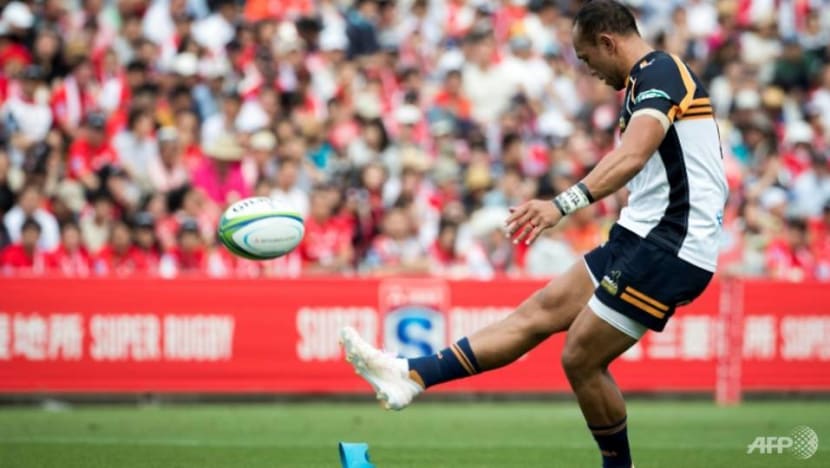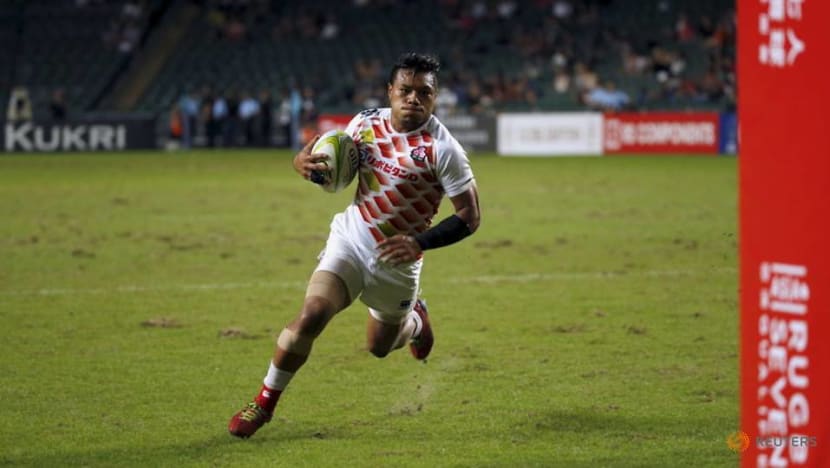commentary Commentary
Commentary: Rugby World Cup – Japan leads the line for Asia
The 2019 Rugby World Cup held in Japan shows the country can become a force to be reckoned with, says John Duerden.

Japanese excitement was at fever pitch during the Rugby World Cup. (Photo: AFP/William WEST)
SINGAPORE: It is not surprising that when World Rugby officials left Japan after the 2019 World Cup finished on Saturday (Nov 2), with a South Africa win over England, they talked of returning to Asia.
READ: South Africans to put economic woes aside and honour Springboks
The first Rugby World Cup to be held in the world’s biggest continent was a roaring success on and off the field.
At the tournament’s closing press conference in Tokyo, World Rugby chairman Bill Beaumont said:
Japan 2019 will be remembered as probably the greatest Rugby World Cup.
“It has certainly been the most ground-breaking in terms of bringing the game to new audiences and attracting new fans to the sport.”
Officials were delighted with stadiums that were 99 per cent full, the 1.2 million people at specially designated fan zones to watch the games on big screens, and 500,000 visitors from around the world.
READ: Fans mingle, tension mounts ahead of World Cup final
READ: 'Plan for everything': Rugby World Cup's advice to Tokyo Olympics
An incredible 54 million people tuned into Japanese television - a record for any rugby game - to watch the national team, nicknamed the Brave Blossoms, defeat Scotland to progress to the knockout stage of the tournament for the first time in nine attempts.
UNITING A NATION
The performance and tournament as a whole gave a nation still recovering from Typhoon Hagibis, which killed over 80 people and left thousands homeless in October, something to get behind.

It was reminiscent of that stunning win by the Japanese women’s football team of the 2011 World Cup just four months after the country had suffered a devastating earthquake and tsunami.
Eight years on from that terrible day when the city of Kamaishi saw 1,300 of its residents killed, the city hosted two World Cup games at the Kamaishi Recovery Memorial Stadium, which sits on the site of a school washed away in 2011.
Such is the power of sport. This World Cup also showed that there is a new power in the world of rugby.

The game has been slow to move from its heartlands of the United Kingdom, France, Australia, South Africa and New Zealand but Japan has been a breath of fresh air.
"One of the reasons we came to Asia was to actually leave a legacy," Mr Beaumont added.
"What we have to do is carry on working with them so when you come back in two years' time, the people are talking about (Brave) Blossoms and not about baseball."
That is still a worry. After years of defeat at the World Cup, Japan shocked the world by defeating South Africa at the 2015 World Cup in England and winning three games in total.
This awakened interest in the country but the excitement quickly faded away.
Four years on, the World Cup has ignited a rugby fever in Japan much more widespread and intense than before. Its rugby bosses are determined not to miss the opportunity this time round.

A NEW RUGBY COMPETITION IN JAPAN
Japanese officials are looking to revamp the structure of the domestic league to make it stronger on and off the field.
In October, Katsuyuki Kiyomiya, the vice president of the Japan Rugby Football Union (JRFU), told reporters that he will hold a news conference in November to announce plans to launch a new domestic competition expected to start in 2021.
“This World Cup is a big event Japanese rugby has not experienced before and we are tested on how we take the excitement and enthusiasm created by this event to the next level,” Mr Kiyomiya said.
Details will follow but reports suggest there will be a new, professional 12-team league run. It will give the current Top League, a low-key affair with teams owned by corporations such as Panasonic, Toshiba and Toyota almost as a public service, a run for their money.
This new league will likely run on a separate calendar to Super Rugby (the southern hemisphere competition that features clubs from South Africa, New Zealand and Australia) and would aim to attract top players from that tournament.

With interest in Japan at an all-time high, Mr Kiyomiya said that the league looks to generate an annual revenue of 50 billion yen (US$460 million) through sponsorship and the sale of media rights.
If so, clubs would not only be able to attract talent from the traditional rugby powerhouse nations but would also be able to offer the best players in Asia the chance to pursue a lucrative career in the sport.
HELPING ASIA
It will help Asia’s rugby aspirations for Japan to continue its ascendance. The success of Japan could serve as an example and an inspiration to its neighbours.
Japan is the only Asian nation to ever appear at the World Cup. It is head and shoulders ahead of the next best teams including Hong Kong, South Korea, Sri Lanka, Singapore and Malaysia.
READ: Memorable moments from Japan's World Cup
If World Rugby can increase representation at the World Cup for Asia, there will be more interest and investment in the sport from Asian nations, past the amateur and semi-professional level.

Japan will benefit from sharpening its craft, if Asia has its own competitive rugby games.
Therefore, it is also in Japan’s interest that Asia improves at the game.
For now, no doubt Japan’s journey serves as an inspiration, but that journey is going to be long.
The Brave Blossoms won just one game in its first seven World Cups from 1987 to 2011, suffering some demoralising thrashings along the way. That feels a long time ago now.
If the passion that has been on display in recent weeks can be harnessed, Japan can become a force to be reckoned with - wherever the World Cup takes place.
John Duerden has lived in Asia for 20 years and covers the region’s sporting scene. He is the author of 3 books including Lions & Tigers - The History of Football in Singapore and Malaysia (2017).















